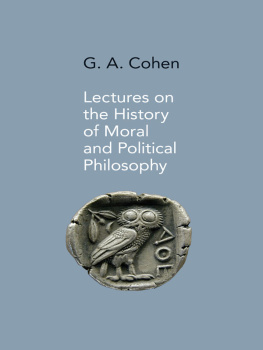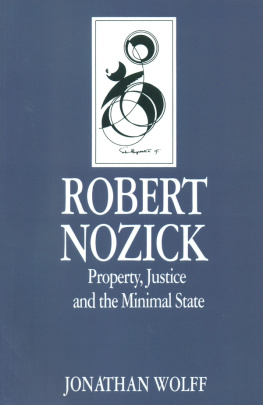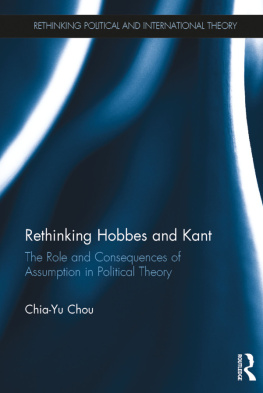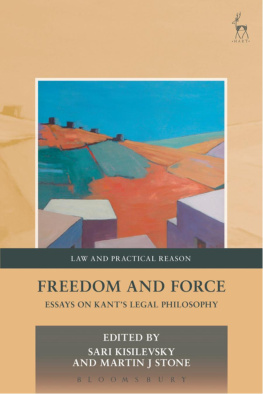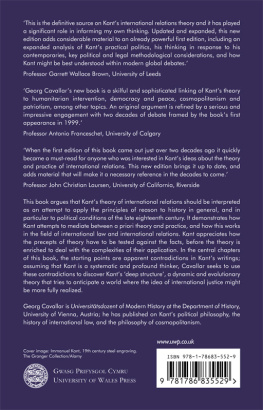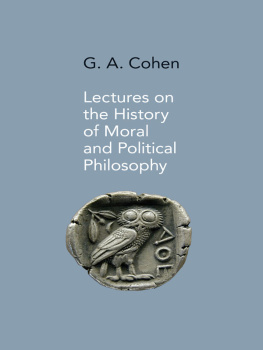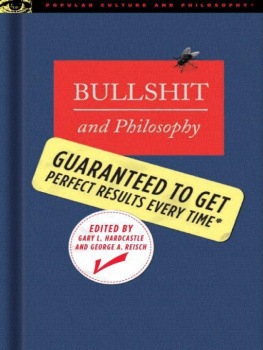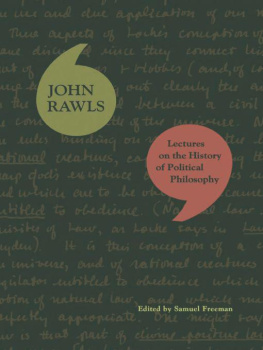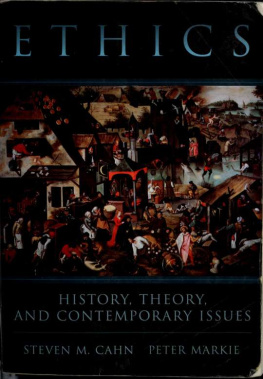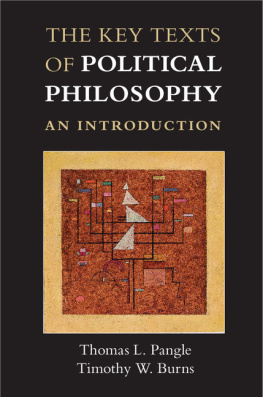
LECTURES ON THE HISTORY OF
MORAL AND POLITICAL PHILOSOPHY
_________________________________________________________
LECTURES ON THE
HISTORY OF MORAL AND
POLITICAL PHILOSOPHY
____________________________________________
G. A. Cohen
EDITED BY JONATHAN WOLFF
PRINCETON UNIVERSITY PRESS
Princeton and Oxford
Copyright 2014 by Princeton University Press
Published by Princeton University Press, 41 William Street, Princeton, New Jersey 08540
In the United Kingdom: Princeton University Press, 6 Oxford Street, Woodstock, Oxfordshire OX20 1TW
press.princeton.edu
Jacket photograph: Owl standing right, head facing. Reverse of a silver tetradrachm from Athens, ca. 480420 BC. Photo: Marie-Lan Nguyen. Location: Museum of Fine Arts of Lyon, France.
All Rights Reserved
Library of Congress Cataloging-in-Publication Data
Cohen, G. A. (Gerald Allan), 1941-2009.
Lectures on the history of moral and political philosophy / G. A. Cohen ; edited by Jonathan Wolff.
pages cm
Includes bibliographical references and index.
ISBN 978-0-691-14900-4 (alk. paper)
1. EthicsHistory. 2. Political sciencePhilosophyHistory. I. Title.
BJ71.C64 2013
170dc23
2013000199
British Library Cataloging-in-Publication Data is available
This book has been composed in Sabon
Printed on acid-free paper.
Printed in the United States of America
10 9 8 7 6 5 4 3 2 1
Contents
________
Jonathan Wolff
Editors Preface
______________
I think I may try to publish a book of wholly unpublished material, consisting of my lectures, or some of them, on political (and some moral) philosophy, with chapters on Plato, Hobbes, Locke, Hume, Kant, Hegel, Marx and maybe Nietzsche. The good thing about the project is that the lectures are, if I may say so, stimulating and interesting. The bad thing is that they dont refer at all to recent scholarly literature on their subjects.
JERRY COHEN, EMAIL (JUNE 14, 2007)
Shortly before his tragic and untimely death, Cohen discussed with Michael Otsuka his plans for producing volumes of his then-uncollected papers. They also considered how to bring that work to completion if he did not live to finish the taska conversation that was sadly prophetic. Two volumes of his papers are now published, under Mikes superb editorship. It was suggested that I might edit a third volume, and I was honored to take on this task.
Cohens writings in this volume fall into two parts. The main section contains Cohens previously unpublished lectures on the history of moral and political philosophy. The second part reprints some writings bearing on the history of political philosophy and ethics that have not previously been included in collections of Cohens work. The third part contains a memoir of Cohen that I wrote for the Proceedings of the British Academy, and sets out an account of Cohens remarkable life and work.
One surprise for many readers will be that this volume does not include lectures on Marx. However, some of Cohens lectures on Hegel and Marx were reprinted as chapters 3 to 5 of If Youre an Egalitarian, How Come Youre So Rich?, and little remaining material was found. That book, therefore, should be regarded as an essential companion to this one, as well as a brilliant work in its own right. Earlier lectures and papers on Marx led to Cohens Karl Marxs Theory of History: A Defence, and the papers in History, Labour, and Freedom, the most important of which were included in the second edition of Karl Marxs Theory of History. Hence most of Cohens writings on Marx are already widely available, with the exception of those now reprinted here. Their contents will be explored below.
, many are based on lectures first given in the 1960s and then subsequently revised. Several, although not all, were still undergoing revision for delivery in Oxford even toward the end of Cohens career there, and have final revision dates of between 1999 and 2004.
Taking the chapters in the chronological order in which they appear in this book, the first chapter, on Plato, is based on Cohens lectures for a course titled Classical Political Thought. From correspondence between Cohen and Richard Wollheim, his head of department at University College London, where he had started lecturing in 1963, it appears that these lectures were first delivered when Cohen was visiting McGill in 196566, where he gave two lecture courses, each requiring three lectures a week. Classical Political Thought was one of these, and Hegel and Marx the other. It appears that he also gave them on his return to UCL. Cohen seems not to have lectured on Plato in the 1970s and 1980s, although he did teach this material in tutorials. However, in 1990 Cohen and Mark Philp together revived an earlier lecture course, Plato to Rousseau, that had previously been offered by Charles Taylor. This took place every second year. The Plato lectures were revised then, for that purpose, and Cohen continued to work on them. Normally Cohen lectured on Plato, Hobbes, Locke, and Hume, with Philp lecturing on Aristotle, Natural Law thinking, Aquinas, Machiavelli, Montaigne, Pascal, Montesquieu, and Rousseau, although in some years some lectures were given by others.
The central focus of Cohens lectures on Plato is the nature/convention distinction, and how it is taken up by the pre-Socratics, and treated in more critical fashion by Plato. The lectures also contain material on Aristotle. This was not revised from the earliest version, although from the notes on the lectures it seems that Cohen did sometimes include this material in his later lectures, or at least make provision to do so.
The next three chapters, on Hobbes, Locke, and Hume, are based on Cohens lectures at Oxford. On taking on the Chichele Chair in Social and Political Theory at Oxford, Cohen agreed to gives lectures on the history of political thought, and this lecture course was devised to meet that commitment. They were certainly given in 198889. Shortly afterward they were incorporated into the course taught with Mark Philp mentioned above. Although Cohen lectured on Locke earlier at UCL, there his focus was private property in the context of explaining and criticizing Robert Nozicks view. This material made its way into print as part of Cohens 1985 British Academy lecture, Marx and Locke on Land and Labour, reprinted in Cohens collection Self-Ownership, Freedom, and Equality. The lectures on Locke included here, with their greater focus on political obligation, form a natural complement to the preceding chapter on Hobbes and to the succeeding chapter on Hume on the social contract. What appear here as three separate chapters were written up as a single set of connected lectures, all of which take political obligation as their central focus.
The lectures on Hegel are essentially an account of the master/slave dialectic from the Phenomenology of Spirit. These, according to the notes on the lectures, were first written in 1968, then revised in 1998, and tidied in 2004. Cohen gave classes at UCL on Hegel for those taking the finals option Hegel and Marx, which ran until around 1980, at which point it was split into two and Cohen concentrated on Marx. However, he taught Hegel again after his return to Oxford in 1985, and continued to run graduate classes, often cotaught with Michael Rosen.
The lectures on Kants ethics were typed up in 1999, but almost certainly date back to the beginnings of Cohens teaching career, perhaps as early as 1963. Cohen was engaged to lecture on ethics at UCL, and he is very likely to have included lectures on Kant at this time, as well as lectures on contemporary themes in ethics. He lectured on ethics in London on his return from McGill in 1966, and probably until the early 1970s, but not again after that as his teaching turned to political philosophy and Marxism. The lectures on Kant fall into two parts; the first is a rather general account of Kants moral philosophy, exploring in particular Kants account of reason. The second part is a tour de force in which Cohen identifies twelve different distinctions made by Kant, which Kant needs to be coexistensive, and documents some of the most significant ways in which Kant fails to achieve his aims.
Next page
